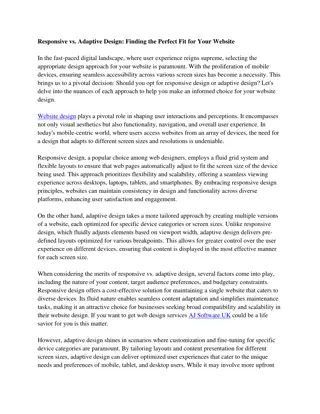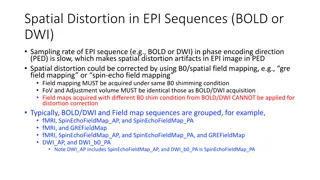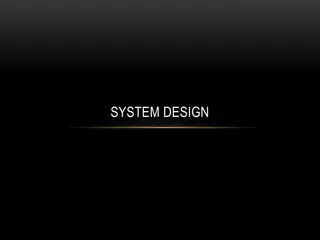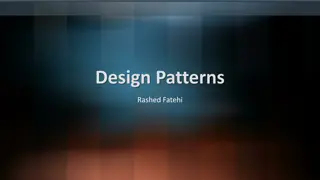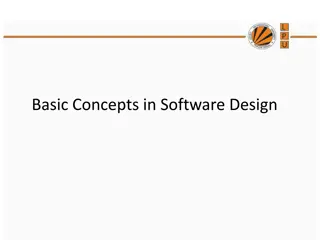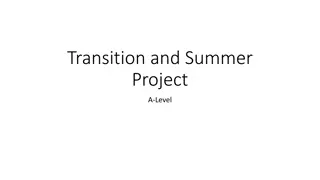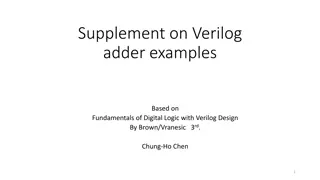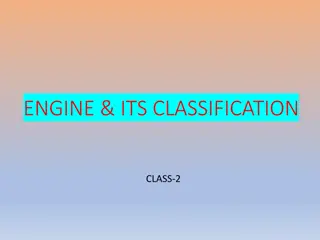GCSE Design Technology Knowledge Organiser and Course Structure Overview
In this detailed knowledge organiser, find information about the GCSE Design Technology course structure, learning objectives, mission statement, and core technical principles for KS4 students. The course emphasizes iterative design cycles, creative thinking, problem-solving, and addressing environm
7 views • 53 slides
Software Analysis and Design Process
Software analysis and design involve a systematic approach to understanding user requirements, creating logical models, and transitioning to detailed design specifications. Requirements analysis focuses on capturing system requirements, while design translates these requirements into implementation
8 views • 16 slides
Textil School for Design, Technology, and Management - Overview
The Textil School for Design, Technology, and Management is a renowned institution funded by the European Union. Offering undergraduate applied studies in Textile and Apparel Design, Textile Engineering, and Management in the Textile Industry, the school focuses on artistic expression, modern method
0 views • 16 slides
If you are searching for Architectural Design in Takapūwāhia
If you are searching for Architectural Design in Takap\u016bw\u0101hia, At HWA - Architecture, we bring years of experience in Architectural Design to projects across New Zealand. With ongoing projects in Otago, Canterbury, Waikato, Kapiti, and Horowhenua, we have established ourselves as a trusted
1 views • 6 slides
Exploring Graphic Design Jobs Near Me: Opportunities and Insights
\n In today's visually-driven world, graphic design plays a crucial role in shaping the identity and communication of businesses, organizations, and brands. From logos and branding materials to digital assets and marketing collateral, the demand for skilled graphic designers continues to grow. If yo
1 views • 9 slides
Responsive vs. Adaptive Design: Finding the Perfect Fit for Your Website
In the fast-paced digital landscape, where user experience reigns supreme, selecting the appropriate design approach for your website is paramount. With the proliferation of mobile devices, ensuring seamless accessibility across various screen sizes has become a necessity. This brings us to a pivota
1 views • 2 slides
Spatial Distortion Correction in EPI Sequences: Field Mapping Examples
Spatial distortion artifacts in EPI sequences (BOLD or DWI) due to slow sampling rates in the phase encoding direction can be corrected using B0/spatial field mapping techniques. This correction requires obtaining field maps under the same B0 shimming conditions and with identical FoV and adjustment
2 views • 4 slides
Analysis of Epi/Stroma Segmentation with High Pixel Agreement Rates
In this analysis of Epi/Stroma segmentation, multiple images were evaluated, showing overall pixel agreement rates ranging from 0.9211 to 0.9625. True Positive Rates were high, while False Negative Rates varied. The study provides insights into the effectiveness of the segmentation process.
0 views • 10 slides
Guidelines for Design of Cement Concrete Pavement and Interlocking Paver Blocks
This document provides guidelines for designing cement concrete pavements and interlocking paver blocks, covering factors governing design, wheel loads, design period, subgrade characteristics, approximate k values based on CBR values, and the importance of a sub-base below concrete pavements. It em
0 views • 67 slides
Epi-Ready: Investigating Foodborne Outbreaks & Epidemiologic Approaches
In Module 6 of the Epi-Ready Epidemiologic Investigation series, participants learn about epidemiologic approaches in responding to foodborne outbreaks. The module covers methods for information gathering, measures of association, statistical significance, case definitions, surveillance activities,
1 views • 41 slides
Software Engineering Design Principles and Concepts
The chapter discusses the essential principles and concepts in software design, highlighting the four key design models - data design, architectural design, interface design, and component-level design. It emphasizes the importance of traceability to the analysis model, minimizing the gap between so
2 views • 36 slides
Pixel Array Status and Drawing Rules for High-Resistivity Epi Design
This collection of images and descriptions provides an overview of the pixel array status as of April 26, 2019, along with drawing rules for high-resistivity epi design. The pixel array features various components such as Pixel_S1, Pixel_S3, and the overall array structure. Drawing rules highlight t
4 views • 9 slides
Best LED Lighting Upgrades in Ashbury
Are you looking for the Best LED Lighting Upgrades in Ashbury? Then contact EPI Electrical Group Pty Ltd. They offer a wide range of electrical services, including maintenance, solar services, switchboard upgrades, LED lighting upgrades, and more. Wi
0 views • 6 slides
Future Perspectives for EU Patent System: Granting and Litigation Systems
The future of the EU patent system envisions a high-quality, centralized Granting System under the European Patent Office (EPO) for substantive examination and granting. Coordination with National Patent Offices (NPOs) and European Patent Institute (epi) is key to stimulate inventions and provide ac
2 views • 8 slides
Strategies for Overcoming Surveillance Challenges During the 2014 Measles Outbreak in the Philippines
The Philippines faced surveillance challenges during the 2014 measles outbreak, including manpower capacity, logistics, data management, and reporting mechanisms. Key interventions involved activating surge capacity, conducting orientations, procuring specimen kits, and promoting efficient data coll
0 views • 18 slides
System on Chip (SoC) Design and Components
Explore the world of System on Chip (SoC) design, components, and working flow. Learn about Intellectual Properties (IP), platform-based design, typical design flows, top-down design approach, and the emerging Electronic System Level (ESL) design flow. Discover the essential components of an SoC, su
0 views • 45 slides
Design Inspiration and Elements in Costume and Fashion Design
Dive into the world of costume and fashion design through a visual journey of finding design inspiration, understanding the design process, emphasizing originality, and exploring different sources of creativity. Discover how technology, art, food, history, architecture, and nature can spark innovati
0 views • 45 slides
Enhancing Piping Design Efficiency with Spec-Driven Technology
Explore how Spec-Driven Piping technology powered by CADACTIVE offers a standardized approach for piping design in Creo Parametric. This innovative extension streamlines design communication, eliminates errors, and improves design efficiency by utilizing a master catalog, automated checking capabili
0 views • 15 slides
Material Design: Combining Classic Design Principles with Technological Innovation
Material Design is a design language that combines traditional design principles with the possibilities offered by technology and science. It emphasizes visual language, classic design elements, and innovation to create delightful user experiences. The Material Metaphor, Imagery, Typography, Color,
0 views • 34 slides
Comprehensive Guide to System Design Components and Techniques
System design involves the detailed planning and identification of components in an information system, aiming to provide users with a general understanding of the new system. This process includes techniques like flowcharts, prototyping, and component design, covering aspects such as output design,
0 views • 24 slides
Design Patterns: A Comprehensive Overview
Exploring the world of design patterns, this content delves into the essence of design patterns, their application in software design to resolve complexity, and the different types of design patterns - creational, structural, and behavioral. It also showcases examples of popular design patterns such
0 views • 22 slides
EPCA Forum 2023: European Payments & Regulations Conference in Riga
EPCA Forum 2023, scheduled for October in Riga, will focus on European payments and regulations. The event features key topics like scheme connectivity, iDEAL and EPI developments, traditional banking challenges, payment service regulations, and competition in acquiring. Attendees can expect insight
0 views • 6 slides
Basic Concepts in Software Design
Software design involves transforming customer requirements into a form suitable for implementation, with activities categorized into preliminary and detailed design stages. High-level design focuses on module identification and control relationships, while detailed design entails defining data stru
1 views • 24 slides
Energy Performance Index for Commercial Buildings
Energy Performance Index (EPI) is a key metric used to evaluate the energy efficiency of commercial buildings. It is calculated based on the annual grid electricity consumption, annual DG electricity consumption, and the built-up area of the building. Various studies and ratings such as ECO-III Benc
0 views • 17 slides
3D Design and Critical Analysis in Architecture
Dive into the world of 3D design and critical analysis with a focus on architecture. Discover the stages of design, essential skills for designers, and areas of study in three-dimensional design. Delve into iconic buildings like Frank Lloyd Wright's Falling Water, analyze their key features, and eve
0 views • 9 slides
Design Patterns in Object-Oriented Design
Design patterns in object-oriented design (OOD) are essential templates that codify best practices for solving common problems. They help streamline development by capturing proven design decisions, promoting code reuse, and enhancing system flexibility and modularity. Learn about the core concepts,
0 views • 20 slides
Interaction Design in Human-Computer Interaction
Interaction design focuses on creating interactive products that are easy, effective, and enjoyable to use. It aims to reduce negative user experiences while enhancing positive ones. Designing interactive products requires understanding user activities, interfaces, and device arrangements to support
0 views • 11 slides
SE2811 Software Component Design Overview
This course covers software component design, design patterns, object-oriented design, algorithms, and opportunities for reuse in systems design. It emphasizes the importance of domain-level design and provides insights into solving core problems through reusable classes.
1 views • 21 slides
Combined Preventive Strategies in Public Health Interventions
MSF's experience in implementing combined preventive strategies focusing on SMC, Vaccination, and Nutrition Screening in various countries like Mali, Niger, Chad, and Nigeria. The interventions aim to address malnutrition, improve vaccination coverage, and reinforce EPI programs. Advantages include
0 views • 7 slides
Analysis of Bunch Lengthening in CEPC for Different Design Parameters
This study explores bunch lengthening in the Circular Electron Positron Collider (CEPC) for various design parameters, analyzing a 54 km design scheme, a 61 km design scheme, and a 100 km design scheme. The analysis includes the theoretical framework used, equations for bunch lengthening, and conclu
1 views • 15 slides
Plain & Reinforced Concrete Structures in Design Engineering
In the design of Plain & Reinforced Concrete structures, various strength design methods such as Ultimate Strength Design (USD) and Allowable Strength Design (ASD) are utilized. These methods involve factors of safety, material strength, load factors, and analysis in the elastic range. Additionally,
0 views • 11 slides
Employee Participation Trends and Challenges in the UK
This presentation delves into the significance of employee participation and involvement (EPI) in the UK, discussing its operation, trends, challenges in precarious labor markets and the gig economy. It highlights the benefits of involving employees in decision-making processes, such as protecting w
0 views • 23 slides
Verilog Adder Examples & Typical IC Design Flow
This comprehensive content delves into Verilog adder examples, typical IC design flow, physical design considerations, and examples of OpenGL ES GPU and ARM hypervisor applications. It covers the fundamentals of digital logic with Verilog design, hardware description language, FPGA prototyping, phys
1 views • 27 slides
Progress Update on Phase-2 CMS Pixel R&D Activities in Italy by Marco Meschini
Marco Meschini presents updates on Phase-2 CMS Pixel R&D activities in Italy. Updates include sensor production, wafer batches funded, thinning processes, bump bonding technologies, and irradiation campaigns. The meeting discusses wafer specifications, Epi wafer procurement challenges, and productio
0 views • 28 slides
Strengthening Country Ownership of Immunization Programs through Parliamentarians
National ownership of immunization programs is essential for providing effective and quality services. Countries must prioritize immunization as a critical aspect of public health. Financial independence is crucial for sustaining immunization efforts as outside donors gradually withdraw support. Wel
0 views • 17 slides
The Importance of Software Design for Data Scientists
Today's ISEA Session 2 with David Beck from the University of Washington delves into the critical role of intentional software design for data scientists. The session covers the software design approach, user-centric design stories, use cases, components, testing strategies, and the benefits and dra
1 views • 76 slides
Engine Classification and Design
Engine classification involves categorizing engines based on various factors such as combustion type, number of strokes, cylinder design, and ignition method. Common classifications include external and internal combustion engines, as well as categories based on the design and use of the engine. Add
0 views • 11 slides
Coverage Evaluation for Preventive Chemotherapy
Methods for evaluating treatment coverage in preventive chemotherapy for neglected tropical diseases (NTDs) are crucial for achieving disease control and elimination goals. Routine data can be unreliable due to various biases and errors, highlighting the importance of population-based surveys for pr
0 views • 21 slides
Doctoral Methods and Substantive Exams Overview
Doctoral students will take two exams, Methods on May 18 and Substantive on May 19. Methods exam has 3 questions focusing on Causal Inference, Study Design, Data Analysis, graded out of 6. Substantive exam covers 12 areas of interest with 2 questions each, except for Epi Methods. Passing grade is 7
0 views • 8 slides
Challenges in Decision-Making with Multiple Surveillance Systems
Handling data from various surveillance sources is a complex task in the Democratic Republic of the Congo (DRC), where multiple systems exist such as the National Surveillance System and EPI Surveillance System. This involves navigating different perspectives and overcoming challenges to consolidate
0 views • 13 slides





